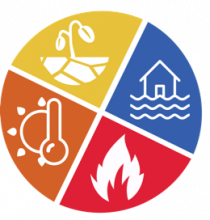Resilient Colorado: Natural Hazards Education for Secondary Science Classrooms
We invite secondary earth and environmental science teachers to learn a new place-based, NGSS aligned science curriculum on natural hazards at the Summer Teacher Institute at Western Colorado University. Participation and course credit (EDUC 510, 1 credit) are free.
Due to COVID-19, the workshop will now be held online. The course will be open June 8-21 for asynchronous learning. Three 90-minute synchronous virtual meetings will be held during these dates and will be scheduled in late May, based on a survey of participants' availability. If participants cannot make a meeting, meetings will be recorded.
The curricular unit includes a lesson on natural hazards (wildfire, flood or drought) that uses current Colorado case studies and local datasets, a scenario-based role-play game, and lessons for students to develop resilience strategies for their hometown to present at a community expo. Instructional strategies include project-based learning, gamification, design thinking and community engaged learning. Additionally, the workshop will include a presentation from a Cooperative Institute for Research in Environmental Sciences (CIRES) scientist on natural hazards in Colorado. The CIRES Education and Outreach team at CU Boulder developed the curriculum, which is part of a program called the Hazard Education Awareness and Resilience Task (HEART) Force. HEART Force is funded by a NOAA Environmental Literacy Grant and is designed specifically for rural Colorado classrooms to increase students’ understanding of natural hazards and community preparedness, and encourages students to act to increase their community’s resilience to natural hazards. The grant covers registration for this course, as well as provides and optional stipend for teachers who would like to teach the curriculum and hold a community resilience expo in their community.

